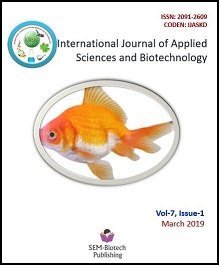Effect of Cultural and Biological Treatments in Managing Clubroot Disease of Cabbage in Sidhuwa, Nepal
DOI:
https://doi.org/10.3126/ijasbt.v7i1.23314Abstract
The Plasmodiophora brassicae Woronin is an important soil pathogen that attacks brassicaceae family of plants. The ability of pathogen to survive in soil for many years as a resting structure even in the absence of suitable host has increased its threat by making it more devastating. Lower effectiveness of treatments applied so far and failure to completely eradicate the disease once it enters the field has posed more problems. The study was conducted at a disease infected field in Sidhuwa, Dhankuta. It was focused on the effectiveness of different cultural and biological treatments against clubroot disease under field conditions. The treatments; lime, combination of lime and vermicompost, Effective Microorganisms (EM) solution and Trichoderma viride were arranged in Randomized Complete Block Design and replicated four times. The yield and yield attributing parameters and clubroot scale were recorded at the time of harvest. Values like Disease Incidence, Disease Severity Index and Disease Control Percentage were calculated based on clubroot scale value. The treatments showed no significant influence on vegetative parameters of the plants and on disease incidence. However, the combined treatment of lime and vermicompost was found to be most effective regarding disease severity and disease control i.e. the least Disease Severity Index (31.25%) and highest Disease Control Percentage (50.94%) compared to the control were obtained from the combined treatment of lime and vermicompost. Effective Microorganisms showed the highest disease severity. The combination of lime and vermicompost used as a treatment yielded highest marketable head weight (1.779 kg) and head diameter (19.90 cm).
Int. J. Appl. Sci. Biotechnol. Vol 7(1): 96-101




